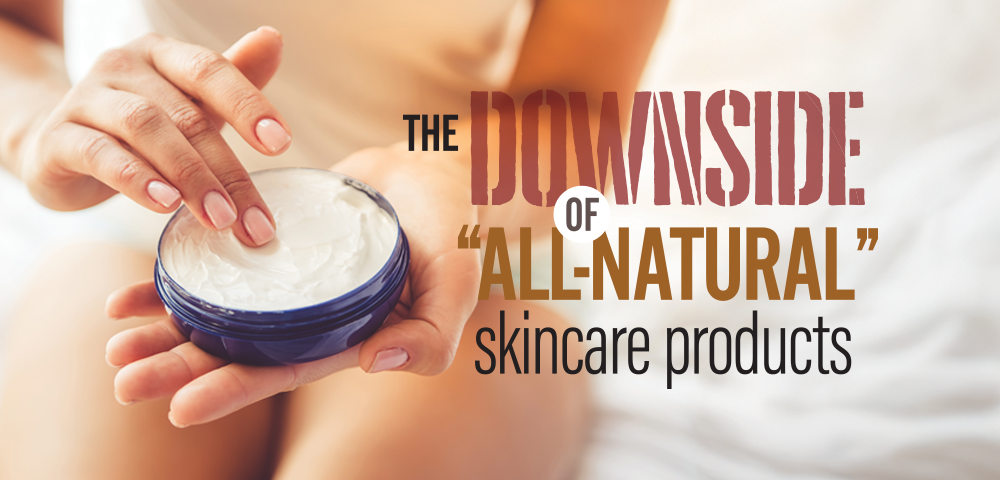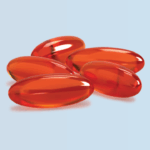
Just because a product is labeled as natural doesn’t mean it is entirely safe or free of synthetic additives.
The skincare industry is rife with marketing terms like “organic,” “non-toxic,” and “chemical-free,” which can be misleading. Just because a product is labeled as natural doesn’t mean it is entirely safe or free of synthetic additives.
MISLEADING MARKETING AND GREENWASHING
The fear of synthetic chemicals has led many consumers to believe that all chemicals are harmful even though everything, including water, is a chemical. This misunderstanding can cause people to avoid effective, scientifically backed ingredients in favor of less effective natural alternatives.
Many companies capitalize on the trend of natural skin care through greenwashing – misleading marketing practices that make products appear more natural or eco-friendly than they are.
WHY “ALL-NATURAL SKIN CARE” ISN’T ALWAYS GOOD FOR YOU
Understandably, the rise of natural skin care has been fueled by a desire for safer, more environmentally friendly products. Many people equate “natural” with “better,” assuming that if an ingredient is derived from nature, it must be superior to its synthetic counterpart. However, this isn’t always correct. While natural skin care can offer benefits, it also has potential downsides that consumers should be aware of.
POTENTIAL ALLERGENS AND IRRITANTS
One of the most significant and common issues with natural skin care is the potential for allergic reactions and skin irritation. Natural ingredients such as essential oils, plant extracts, and certain botanicals can be highly potent and may irritate the skin temporarily or chronically. Unlike synthetic ingredients, which are often formulated to minimize the risk of irritation, all-natural products often don’t undergo the same testing or standardization. Common irritating ingredients found in all-natural products are:
Essential oils: Lavender, peppermint, and eucalyptus oils are used for their aromatic and therapeutic properties. However, these oils are highly concentrated plant extracts that can cause temporary and chronic skin reactions, especially in sensitive individuals. For example, tea tree oil, known for its antibacterial properties, can cause irritation, dryness, and even chemical burns if not properly diluted.
Botanical extracts: Plant-based ingredients such as citrus extracts are often praised for their soothing and brightening effects. However, they can also trigger allergic reactions. Citrus extracts, like lemon or orange oil, can increase photosensitivity, leading to sunburns or hyperpigmentation when the skin is exposed to sunlight after application.
Fragrance allergens: Natural fragrances derived from flowers and herbs are common allergens. Geraniol, limonene, and linalool, found in many skincare products and essential oils, are well-known irritants that can cause redness, itching, and rashes, especially in people with sensitive or eczema-prone skin.
POTENTIAL FOR CONTAMINATION
A hallmark of many all-natural products is the absence of synthetic preservatives designed to inhibit the growth of bacteria, mold, and yeast. Because of their organic nature, all-natural products are more susceptible to contamination.
While natural preservatives like rosemary or grapefruit seed extract are used, they are often less effective over time or in complex formulations. Without synthetic preservatives, often vilified in the natural skincare community, these products can harbor bacteria, mold, and yeast. A natural cream or serum stored in a warm, humid bathroom can quickly become a breeding ground for harmful microorganisms, leading to spoilage that may not always be visible but can still harm the skin or body. We all want to avoid endocrine disruptors and harmful ingredients. However, there are synthetic preservatives that keep your product germ-free while also being gentle and safe if used at appropriate levels.
POTENTIAL FOR INCREASED PHOTOSENSITIVITY
Increased photosensitivity is a hidden risk in many all-natural skincare products, where certain plant-based ingredients can make the skin more vulnerable to UV damage. Common oils like citrus oils, including bergamot, lemon, and lime oils, are commonly used in natural skin care for their refreshing scent and brightening properties. However, these oils contain compounds that can make the skin more sensitive to UV light, increasing the risk of sunburn and long-term damage like hyperpigmentation or accelerated aging. For example, St. John’s Wort and other plant extracts can make the skin more prone to sun damage. The same goes for other herbs like angelica root or grapefruit extract.
LACK OF STANDARDIZATION AND REGULATION
The terms “natural” and “clean” are not strictly regulated in the skincare industry, meaning anyone can claim a product is natural, despite it being fact or not! This lack of regulation means that products labeled as natural may still contain synthetic ingredients or could be formulated in a way that isn’t entirely safe for skin use. Additionally, the concentration of natural ingredients can vary from batch to batch, leading to inconsistencies in product efficacy and safety.
While natural skincare products can benefit some individuals, they are not universally superior to synthetic alternatives. Consumers should be cautious of the potential risks, including allergens, lack of standardization, contamination, and ineffectiveness for specific skin concerns. It’s essential to thoroughly research the product and its ingredients, and also purchase from reputable companies that thoroughly research and test products and their ingredients.











